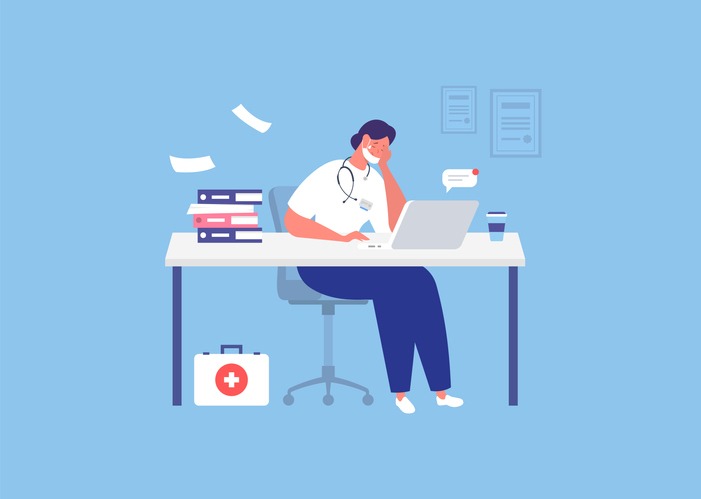
It’s no secret that being a GP is a rewarding yet stressful job, and it can be a challenge to maintain positive energy throughout and after a busy shift – here are six tips to help alleviate that stress
CREDIT: This is an edited version of an article that originally appeared on Lantum Blog
Standing in as a replacement for unfilled sessions, along with IT issues in a practice, are just a few examples of stress sources. Along with possible financial pressures and lack of peer support, it is no surprise that your job can rapidly overwhelm your day-to-day life.
These stresses, if left unmanaged, can carry severe consequences for GPs both professionally and personally.
Therefore, it is important to recognise the signs early on, and find ways to deal with stress to get back on track at work.
Unfortunately, there’s no simple ‘one-size-fits-all’ approach to something as complex as psychological stress, but there are ways to manage those levels before they become too much – as the following tips, documented by medical professionals, will show.
6 tips to alleviate stress
Professional detachment
This is something that healthcare professionals learn early on in their career, but don’t always apply to themselves. It’s an unnatural act for many, but GPs need to separate themselves from emotionally challenging situations with patients.
It should be clear though, we aren’t suggesting that you turn off your emotions or ignore the plight of your patients, but instead – to detach yourself from your patient’s issues outside of the examination room. This both helps you to focus on the diagnosis of your patient when needed and define a separation between your doctor life and personal life.
Keep your passion and a sense of perspective
It’s easier to say than do but try to stay positive! If you are having a particularly stressful day or week, try to take a short break, grab some air, take a few deep breaths and try to remember the big picture; why did you chose this vocation?
The answer is usually simple one: to help people and make a genuine, positive difference to lives.
That small piece of perspective will usually help clear your mind and allow you to focus on the job at hand once more.
Learn to forgive yourself
Let’s face it, clinicians are known perfectionists, especially when your job requires such complex effort, but at the end of the day, you are only human, and you must learn to put less pressure on yourself.
Just like in every other profession, you are prone to making mistakes, but when someone’s wellness is in your hands, the demand to be faultless can be harder to deal with. If you ever do make a mistake, don’t ignore it, take time to understand it, learn from it and then forgive yourself. You’ll feel much better for it.
Look after yourself and take a break
Dedicate yourself some me-time, even if that means just a short pause between sessions. It is essential to use your personal space to unwind and allow your brain to rest.
Although seeing back-to-back patients can feel mundane at times, maintaining a personal hobby outside of work, can truly help sharpen your focus, bring excitement to your routine and sustain your happiness levels.
Don’t be afraid to try new relaxation methods such as yoga, or even download a mindfulness app, such as NHS-approved Be Mindful.
Maintain an active & healthy lifestyle
Prescribe yourself some sleep as you would to your recovering patients. Lack of sleep will only worsen your ability to handle the workload and induce more irritation.
Stick to a balanced meal plan and make sure you attend regular workouts, regardless of how busy you are at the practice. Developing these good habits will help clear negative feelings and reduce some of the emotional intensity you’re experiencing.
Engage with your peers
You know what they say! Doctors make the worst patients. It’s easy to forget that you might need help too. If your stress levels are particularly high, it’s good to open up to someone.
Often colleagues can offer an outlet for you to express any concerns, or just to talk about what is troubling you. Even a casual conversation about your day has its benefits – you will soon realise that you are not alone and gain an alternate insight into the way you are feeling.



Be the first to comment